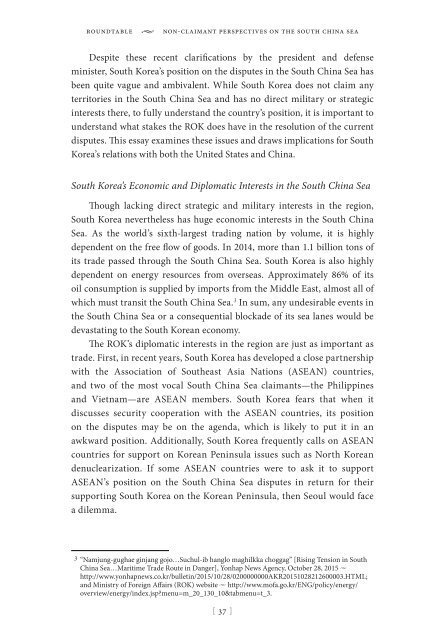You also want an ePaper? Increase the reach of your titles
YUMPU automatically turns print PDFs into web optimized ePapers that Google loves.
oundtable • non-claimant perspectives on the south china sea<br />
Despite these recent clarifications by the president and defense<br />
minister, South Korea’s position on the disputes in the South China Sea has<br />
been quite vague and ambivalent. While South Korea does not claim any<br />
territories in the South China Sea and has no direct military or strategic<br />
interests there, to fully understand the country’s position, it is important to<br />
understand what stakes the ROK does have in the resolution of the current<br />
disputes. This essay examines these issues and draws implications for South<br />
Korea’s relations with both the United States and China.<br />
South Korea’s Economic and Diplomatic Interests in the South China Sea<br />
Though lacking direct strategic and military interests in the region,<br />
South Korea nevertheless has huge economic interests in the South China<br />
Sea. As the world’s sixth-largest trading nation by volume, it is highly<br />
dependent on the free flow of goods. In 2014, more than 1.1 billion tons of<br />
its trade passed through the South China Sea. South Korea is also highly<br />
dependent on energy resources from overseas. Approximately 86% of its<br />
oil consumption is supplied by imports from the Middle East, almost all of<br />
which must transit the South China Sea. 3 In sum, any undesirable events in<br />
the South China Sea or a consequential blockade of its sea lanes would be<br />
devastating to the South Korean economy.<br />
The ROK’s diplomatic interests in the region are just as important as<br />
trade. First, in recent years, South Korea has developed a close partnership<br />
with the Association of Southeast Asia Nations (ASEAN) countries,<br />
and two of the most vocal South China Sea claimants—the Philippines<br />
and Vietnam—are ASEAN members. South Korea fears that when it<br />
discusses security cooperation with the ASEAN countries, its position<br />
on the disputes may be on the agenda, which is likely to put it in an<br />
awkward position. Additionally, South Korea frequently calls on ASEAN<br />
countries for support on Korean Peninsula issues such as North Korean<br />
denuclearization. If some ASEAN countries were to ask it to support<br />
ASEAN’s position on the South China Sea disputes in return for their<br />
supporting South Korea on the Korean Peninsula, then Seoul would face<br />
a dilemma.<br />
3 “Namjung-gughae ginjang gojo…Suchul-ib hanglo maghilkka choggag” [Rising Tension in South<br />
China Sea…Maritime Trade Route in Danger], Yonhap News Agency, October 28, 2015 u<br />
http://www.yonhapnews.co.kr/bulletin/2015/10/28/0200000000AKR20151028212600003.HTML;<br />
and Ministry of Foreign Affairs (ROK) website u http://www.mofa.go.kr/ENG/policy/energy/<br />
overview/energy/index.jsp?menu=m_20_130_10&tabmenu=t_3.<br />
[ 37 ]


